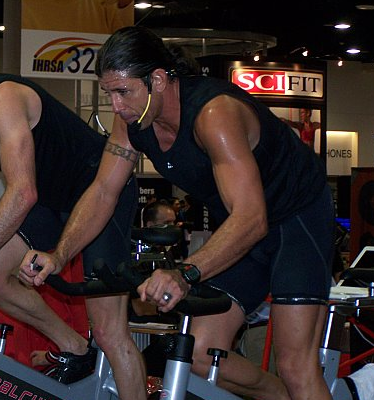In
Part 1, I talked about how to stay motivated, in response to a comment by Amy. If you didn't read that post, have a quick look now... It's okay, I'll wait for you...
2) PROGRESSION
I love going to the gym, but I understand that for lots of people it's not an option, through cost or availability or sheer opposition to working out in a crowded, air-conditioned gym when there are hundreds of other things to do. For some of these people, exercising at home is the perfect solution... and yes, it
can be. But only if you do it right.
Progression is something that happens naturally in a gym. When one level on the bike or cross trainer gets easy, you move up. If you're lifting an easy weight, you choose a heavier one next time. But some home exercise equipment doesn't have that option, or they only have a couple of settings. Or people who like to run always take the same 4 mile route and never deviate or speed up. Can you see the problem?
When you start a new exercise programme, especially if you've been previously inactive, your body is shocked into making huge changes: it has to get fitter very quickly, the lungs and heart have to become stronger to keep the air and blood circulating. Your body requires more fuel, so as long as you're not eating more you start to lose weight.
But when your body reaches the perfect state where it can efficiently match your requirement, using less fuel and muscle power because it's figured out the easiest way to do it, you simply ask it to do the
same thing again and again.
Your body will respond (get fitter, lose weight) if you keep pushing it. Here are some great ways to progress:
For runners:
- Interval training - find a slope/hill, sprint up it, walk down it x 10 (or 20, depending on length of slope)
- Run your normal route the other way around
- Lengthen your run
- Shorten your run, but run faster
For people with exercise bikes/cross trainers:
- If you listen to music, try speeding up a little when each new song starts until you can't go any faster, then slow back down to your original speed and start again
- If you watch soaps, sprint at the start of a new scene, then slow down at the start of the next, and repeat
- If you always cycle for 20 minutes, do one session a week that's twice as long
- If you're short of time, sprint for 10 minutes
For people who do exercise DVDs:
- Buy a new one!
- Take the moves you've learnt from the DVDs and make up your own circuit - time yourself for 30 seconds each station with 10 seconds recovery time:
- Jog on the spot
- Squat
- Star jumps
- Lunges
- etc...
Hopefully that's given you a few ideas. Don't forget Part 3 in a couple of days' time.
I'll be talking about how to build muscle and why it's important.

